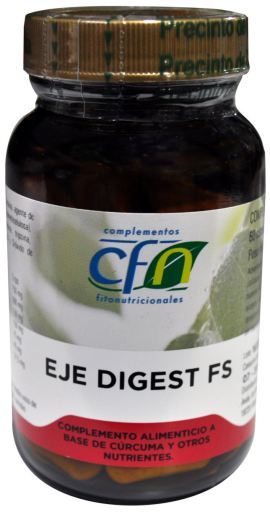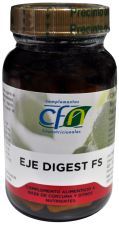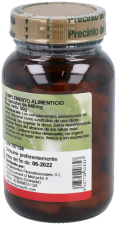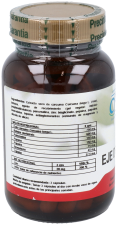- Description
- Features
- Ingredients
- Brand
CFN Digest FS Axis is a food supplement based on active ingredients that support the digestive process.
Properties of the active ingredients:
Turmeric: becomes an ideal spice to protect the liver in a completely natural way, thanks to the presence of curcumin, caffeic acid, borneol, eugenol and turmenone, all substances with hepatoprotective action (i.e. they help to protect the liver cells). Turmeric is an excellent tonic for the digestive system, so it is very interesting to facilitate and improve digestions, especially when there are slow or heavy digestions. Its consumption is very useful in case of dyspepsia and especially in a type of chronic gastritis in which hypochlorhydria (lack of acid secretions in the stomach) is produced. It is also useful to facilitate the digestion of fats, thanks to its cholagogue effect, which is why it is so interesting in case of copious and excessive meals. Turmeric is rich in zingiberene, an active compound that stands out for its anti-ulcer qualities. It also provides 1-phenyl-hydroxy-N-pentane, a system capable of stimulating secretions of pancreatic juices, gastrin and secretin. In addition, it helps to maintain the gastric pH. In case of gas and flatulence, turmeric naturally helps to reduce them, thanks to its carminative qualities, which help to expel gas from the intestine, which is why it is suitable for relieving intestinal gas. Turmeric provides a useful anti-inflammatory effect to reduce the symptoms associated with rheumatoid arthritis and carpal tunnel syndrome. This is demonstrated by numerous scientific studies, which have proven curcumin's anti-inflammatory qualities.
Betaine: Betaine HCL is a non-essential nutrient and a source of hydrochloric acid, a chemical that naturally originates in the stomach and breaks down fats and proteins. It is necessary for the metabolism (absorption) of protein, calcium, vitamin B12, and iron. The low pH of the stomach's hydrochloric acid allows it to digest bacteria and microorganisms that may have been ingested. There are no food sources of Betaine HCL, but it occurs naturally in the parietal cells of the stomach.
Pancreatin: This is a mixture of digestive enzymes naturally found in the intestines. Digestive enzymes are complex proteins that are involved in digestion and produce chemical changes in other substances. They work optimally at specific temperature and pH. They enable the digestion of fats, proteins and sugars. Digestive enzymes include pancreatic enzymes, plant enzymes and enzymes derived from fungi. There are 3 classes of digestive enzymes: proteolytic enzymes, required to digest proteins; lipases, required to digest fats; and amylases, required to digest carbohydrates.
Pepsin: Pepsin is a digestive enzyme that is released in the stomach as pepsinogen. The release of hydrochloric acid stimulates the release of this basic form of pepsin. When pepsinogen is exposed to hydrochloric acid in the stomach, the pepsinogen unfolds and breaks down into pepsin. The main function of pepsin is to break down proteins found in food, such as la and los , into smaller pieces (polypeptides). It degrades proteins only at certain points, so the protein is not completely digested at the amino acid level. For that to happen, the food has to pass into the intestines, where other enzymes complete the digestion process.
Papain: is a proteolytic enzyme, that is, with the capacity to digest the proteins of the food and neutralize the gastric acids, favoring the digestion and avoiding the formation of gases. It is similar to the pepsin found in gastric juice, or the trypsin present in pancreatic juice. It is obtained by the extraction of the white liquid through some cuts in the green papaya and the leaves of the papaya.
Bromelain: it is a digestive enzyme of protein nature, similar to those of our organism and that provides us with a great amount of medicinal effects. It could be a good alternative as an anti-inflammatory, for pain reduction and as an aid to digestion. It is a substance that we find in the family of bromeliads, mainly in the pineapple and, specifically, in the stem. It is part of the group of polyphenols (great antioxidants). It has been proven that it acts by breaking down proteins, converting them into amino acids and peptides, small molecules capable of being absorbed, it also inhibits the prostaglandins that cause inflammation, in addition it stimulates the formation of enzymes that degrade the protein that surrounds the inflamed area.
Trypsin: is a peptidase enzyme, which breaks the peptide bonds of the prostaglandins
- Reference8427729003327
-
Brand
CFN
-
Units
60 Units
-
Product Type Supplements
250 mg of turmeric extract.
200 mg of betaine HCl.
50 mg of pancreatin.
50 mg of pepsin.
25 mg of potato.
15 mg of bromelain.
12.5 mg trypsin
Turmeric dry extract (Curcuma put L. (Root)), betaine, coating agent (vegetable gel: hydropropylmethylcellulose), pancreatic, zinc bisglycinate, pepsin, papaline, bromelain, trypsin, anti-caking agents (magnesium and silicon dioxide layer).




